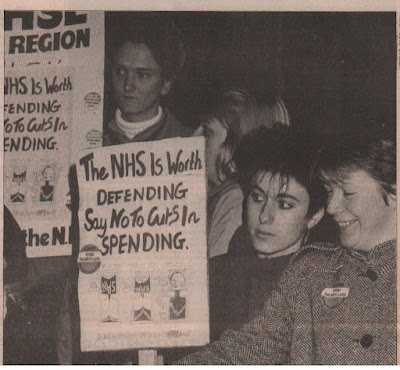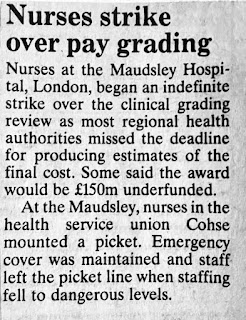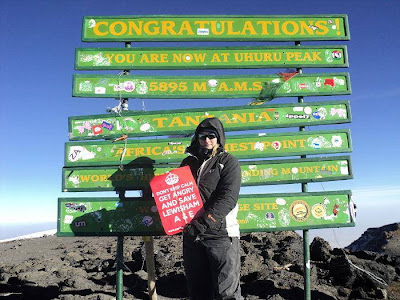Striking nurses are in the news, a rare occasion but not unique. There was a wave of nurses strikes in Britain in 1988, starting with a one day walkout at North Manchester Hospital in January and spreading to hospitals in London and elsewhere. Nurses at the Maudsley Hospital in Denmark Hill were the first to strike in London, walking out for the day on 2 February 1988 a day ahead of a national day of action which saw strikes and protests in many places.
 |
| Above and below - pickets at the Maudsley on 2 February 1988 |
 |
| Militant, 5 February 1988 |
The day of action on 3rd February included a march called by London hospital strike committees which was blocked by police in Whitehall with four arrests. I remember the demo moving to block the traffic on Westminster Bridge.
Two weeks later on the 16th February there was a further day of action in London in which 12,000 hospital workers took part. The day ended up with several hundred marching to the town hall in Brixton for a rally. Nurses at the Maudsley again went on strike.
 |
| Guardian, 17/2/1988 |
Another day of action on 14th March saw London bus crews, dockers, miners and others taking unofficial action in support of NHS workers. I was working at Lambeth Council at the time and some of us marched to join the protests outside the Maudsley Hospital and Kings Hospital on the other side of the road. I think it was on this day that I took these two rather poor pictures!
 |
| 'we care, do you?- Kings Hospital, 1988 |
 |
| Pickets in the rain outside the Maudsley |
 |
| Guardian, 15 March 1988 |
It was very much a rank and file led movement with nurses at individual hospitals organising one day strikes and days of action with limited support from national unions. Nurses were divided between three unions- NUPE (National Union of Public Employees), COHSE (Confederation of Health Service Employees) and the Royal College of Nursing. The RCN was opposed to action, though many of its members argued at the time for it to change its no strike policy; the leaderships of the other unions were decidedly lukewarm. The TUC did call a big demonstration in support of the health service on 5th March, with a crowd of up to 100,000 in Hyde Park, though some angry nurses tried to storm the stage to speak as no health workers had been invited to address the crowd
The movement was largely successful. The Government had been planning to offer a 3% pay rise and was also intending to scrap national pay bargaining. In the event a new clinical grading structure resulted in average pay increases of 15%.
Concerns about whether the pay rises would actually be implemented led to another walk out at the Maudsley in September. This was one of the the first indefinite strikes by nurses in Britain, lasting for 12 days from 5 September 1988.
 |
| Guardian, 6 September 1988 |
 |
'Maudsley Hospital Nurses Strike... the strike is aimed at forcing the government to honour its promise made in May of this year to fully fund the new Clinical Grading system' |
[update - as stated above, the Maudsley workers believed they were the first ever nurses to stage an indefinite strike, and this was how the strike was reported at the time. However Michael Walker at the COHSE history blog records an earlier indefinite strike at Tooting Bec Hospital in 1975. That lasted for two days, so the Maudsley strikers were certainly setting some kind of record with their 12 day walkout- at the very least the first nurses strike to last continuously for more than a week]



























